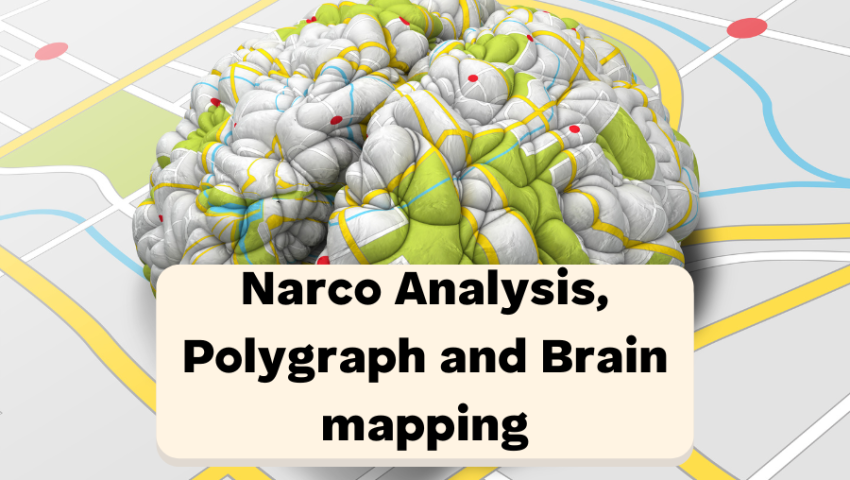
How is a Narco Test performed?
Narco Analysis Test in Criminal Investigation System
There are several methods for Criminal Investigation, to detect lying and deception by the suspect and accused.
Modern techniques like polygraph, narco-analysis, and brain mapping tests are non-invasive methods that will detect deception without causing physical or mental injury to the subject.
Scientific techniques are necessary for proving the guilt as well as the innocence of the accused.
Narco – Analysis is one such scientific progress that has become increasingly, common in India.
The term Narco-Analysis is derived from the Greek word narko ( meaning anesthesia or Torpor) and is used to describe a diagnostic and psychotherapeutic technique that uses psychotropic drugs, particularly barbiturates.
• This technique is used for investigation purpose
• It is a process of abreaction or catharsis
• Also known as Truth Serum Or Drug Hypnosis or Narco interview technique.
• Hypnosis is induced by using barbiturates or another psychotropic drug as a means of releasing repressed feelings.
• Technique effective in two ways – Therapeutic and Rehabilitative.
Procedure of Narco Analysis Test
The narco-analysis test is conducted under strict medical supervision and requires a specialized team of professionals, typically including:
- An anesthesiologist
- A psychiatrist
- A clinical/forensic psychologist
- An audio/videographer
- Nursing and technical support staff
Steps in the procedure:
- The subject’s medical condition is evaluated to determine the correct dose.
- Sodium Pentothal is administered intravenously in a controlled environment.
- The dose varies based on the person’s age, sex, weight, and health status.
- The subject gradually enters a semi-conscious, trance-like state.
- Investigators begin questioning once the subject starts showing signs of reduced inhibition, such as fumbling speech.
- The entire session is monitored (blood pressure, pulse, and oxygen levels) and documented through audio and video recordings.
Effectiveness of Narco Analysis
- Investigative leads: The test can sometimes yield valuable clues or hidden information that conventional interrogation fails to extract.
- Unreliable accuracy: Subjects may mix fact with imagination, provide irrelevant details, or still resist revealing the truth.
- Legal limitation: In India, courts do not accept narco test results as direct evidence. At best, they can provide supplementary leads for further investigation.
Importance of Narco Analysis
Despite its controversies, narco-analysis has been considered significant in specific contexts:
- Criminal investigations: Used as a last resort in severe cases like terrorism, organized crime, or serial killings when other evidence is lacking.
- Forensic aid: Helps investigators trace possible leads when conventional interrogation fails.
- Medical uses:
- Diagnose certain mental health issues
- Restore speech in mute individuals
- Help patients with amnesia recall forgotten memories
- Assist in bringing out suppressed or repressed conflicts
Concerns Associated with Narco Analysis
The test raises serious concerns:
- Human rights violations: It may infringe on the subject’s right to privacy and the right against self-incrimination under Article 20(3) of the Indian Constitution.
- Right to life and liberty: The procedure can be seen as a violation of Article 21, which protects dignity and personal freedom.
- Reliability issues:
- Individuals with high drug tolerance (e.g., alcohol dependence) may resist the effects.
- Subjects can still lie, deceive, or mix false information with the truth.
- Potential misuse: Without strict legal safeguards, narco-analysis could be misused by authorities, leading to wrongful accusations or coerced statements.
Conclusion
The Narco Analysis Test is not a foolproof tool. Due to its low reliability, questionable scientific basis, and ethical concerns, it cannot be used to extract legally admissible evidence. At best, it acts as a supplementary investigative aid, helping investigators generate leads in complex cases.
Governments and law enforcement should:
- Use scientific methods to improve investigations.
- Enforce strict guidelines for narco-analysis to prevent abuse.
- Ensure that human dignity, consent, and constitutional rights are protected at all times.
In short, narco-analysis should be seen as a last-resort investigative tool, not a substitute for scientific evidence and lawful investigation.
Mrityunjay Singh
Leave a comment
Your email address will not be published. Required fields are marked *

